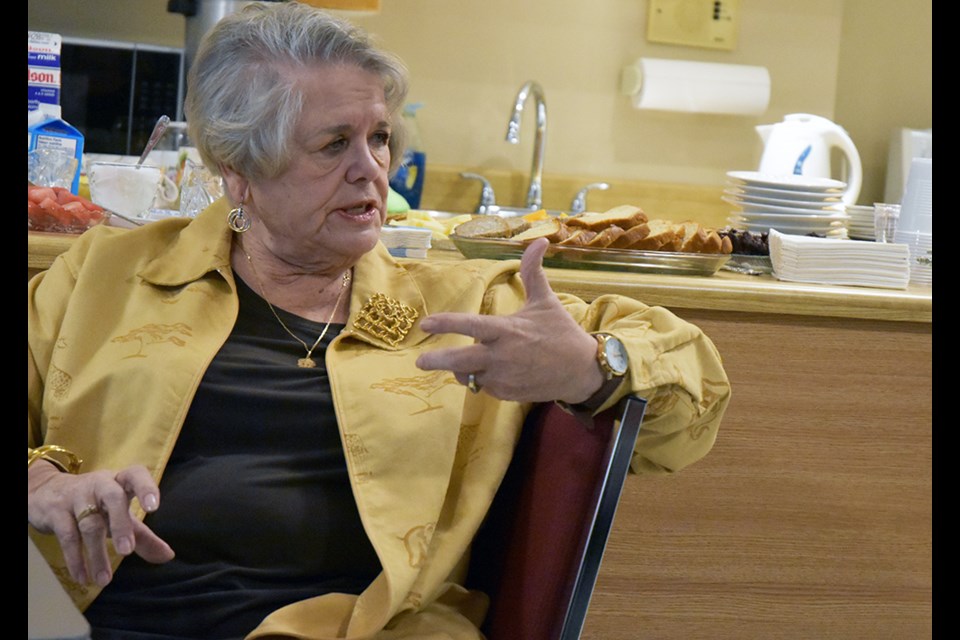Sharon Jewett’s background has shaped the way she approaches her current passion.
A teacher and educator, she now works with Newmarket-based High Adventure Gospel Communication Ministries, on mission trips to Africa – providing pastoral training, and teaching local women sewing skills.
On every trip to Africa, she not only packs her luggage with donations – including handmade sanitary napkins for women, and quilts – she brings along supplies that the women can use to make their own items to become more self-sufficient.
“I’m the collector. If you have thread you want to get rid of, if you have pinking shears you want to get rid of, if you have good scissors you want to get rid of – give them to me. I’ll put them in my suitcase,” Jewett said. “I’m a scavenger. I buy here very cheaply, and pack my three 50-pound bags.”
All of her own clothes and personal supplies go in a carry-on.
Jewett was a guest speaker at a Reaching Ontario, Sharing Education (R.O.S.E.) program meeting organized by the Bond Head Women’s Institute, offering a glimpse of mission work in Uganda through photographs.
Uganda is a relatively small nation, “about the size of Oregon,” she said. It has a population of approximately 34 million – and almost as many refugees, displaced by turmoil in neighbouring Sudan, Democratic Republic of Congo, Tanzania, and at the time of its 1994 genocide, Rwanda.
“Uganda has the most refugee camps of anywhere in the world,” Jewett noted. “Most of them would love to go back, if things settle down. Africa is still very much a hotbed of rebellion.”
The situation is even more unsettled in West Africa in countries like Nigeria, Niger, Burkina Faso and Ivory Coast, she said.
“This part of Africa is where you don’t want to go, unless you have to be there.”
In Uganda, Jewett has visited villages and mission schools, including a training school where former child abductees and refugees receive six months of classes – training the girls as hairdressers, and the boys as tailors. On graduation, each student receives the supplies they need to start a small business in their home village.
Teaching materials and supplies are paid for by the ministry.
“We raise money for sewing machines here,” Jewett explained. “My friends and I pay the salaries for a lot of teachers.”
She was asked if the training was really appropriate, for the largely rural country.
“It makes them a little more self-sufficient, even if they can’t make a living at it,” she replied, noting that in the two years since the training school opened, four classes have graduated, and the school continues to monitor their success.
Jewett noted that mission work has changed over the past decade. In the past, each mission group worked in isolation. Now, there is greater co-operation between the various groups to bring a shared message of better education and hygiene, peace and reconciliation among formerly warring groups, as well as the gospel.
And the focus has become self-sufficiency. Mission groups now hand out bags of seed – peas, barley, wheat – to leaders of villages, instead of food donations. Solar-powered Sunset Radios are tuned to local radio stations, delivering not only a message of the gospel, but music, local news, and valuable health and nutritional information.
Schools receive supplies, and each village gets the same number of soccer balls – two apiece, and no more – to prevent jealousy and resentment.
Experts are brought in to work with the local people, designing and installing irrigation systems, planting gardens and groves of coffee and orange trees, at clinics and schools.
“We know that eventually they have to be self-sustaining in a lot of areas,” said Jewett. “I’m impressed with the Ugandans who have been given opportunity, and who have gone back and invested in their own people.”
Jewett said she has most enjoyed the pastoral training aspect of her work. It costs about $250 to train a new pastor – but that “investment” is multiplied when those pastors return to their communities.
“By training 20 pastors, you’re affecting another 2,000 people,” she said.
On every trip to Africa, Jewett also takes time out to visit the countryside, most recently going “gorilla trekking” in the Ugandan rainforest.
“It’s gorgeous country,” she said, although political turmoil in Africa does require precautions. “You have a guide, and your guides have guns.”
And there is plenty of poverty, especially in the refugee camps. “I came back to my meagre hotel room, and I cried,” Jewett said of one trip.
Despite the challenges, she urged people to become involved in mission trips, especially youth.
“I encourage young people to do these trips,” she said. “It opens their eyes. It changes their lives. They need to see.”
Jewett, now 75, intends to continue her mission work.
“As long as I have the energy and a little cash, I’m ready to go,” she said.



